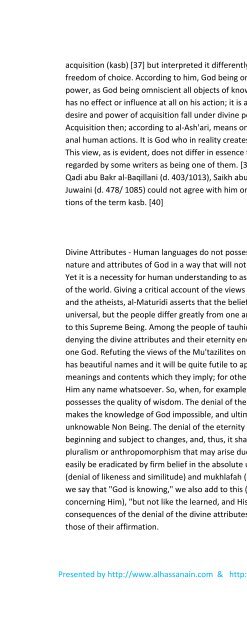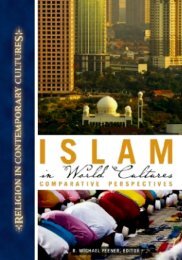- Page 2:
Committee Of Directors Preface Intr
- Page 6:
6. M. Abdul Hye, Vice‐Principal,
- Page 10:
In the end I have to note with grea
- Page 14:
customs, and mores. Each of these c
- Page 18:
determination of the life‐span of
- Page 22:
Idrisi; and such celebrated literar
- Page 26:
More‐over, in the account given o
- Page 30:
the same as Hegel's. But, according
- Page 34:
F The chief aim of this work is to
- Page 38:
considered indispensable for our wo
- Page 42:
excluded from the group of the Veda
- Page 46:
1. Celestial Gods‐ The oldest god
- Page 50:
Brahmanas (commentaries),and the Ar
- Page 54:
contain flashes of insight, yet the
- Page 58:
individual with the Universal Soul
- Page 62:
accommodate not only the gods of th
- Page 66:
The Carvaka is a non‐Vedic, mater
- Page 70:
converted to his viewpoint and in d
- Page 74:
interests including the intellectua
- Page 78:
contemplation, and silence have to
- Page 82:
2. The Yogacara School of Subjectiv
- Page 86:
associated with matter is involved
- Page 90:
Through meditation and self‐tortu
- Page 94:
After creating the elements, Brahma
- Page 98:
The first category by the name of p
- Page 102:
Book 6 contains duties of the four
- Page 106:
There was, however, no imposition o
- Page 110:
[30] Zimmer, Philosophies of India,
- Page 114:
Theism from the Vedic to the Mohamm
- Page 118:
civilizations In developing their p
- Page 122:
Taoism, as set forth in the Tao Te
- Page 126:
structure of ethical and social rel
- Page 130:
The Nameless is the origin of Heave
- Page 134:
of Confucianism over all the other
- Page 138:
[11] Alfred North Whitehead, The Ai
- Page 142:
Chinese Epicureanism Yang Chu's Gar
- Page 146:
We shall, therefore, make as the ba
- Page 150:
and punctiliously ritualistic aspec
- Page 154:
is chiefly a list of fravashis (see
- Page 158:
But these six Amesha Spentas are al
- Page 162:
time: every (righteous) man thus go
- Page 166:
Daena as "religious works," ethical
- Page 170:
doubt that it will come back from v
- Page 174:
y this pace we may extend the battl
- Page 178:
will not be a mere re‐identificat
- Page 182:
But apart from this direct influenc
- Page 186:
[27] Ibid., I. 2 ff. [28] Denkart,
- Page 190:
For Homer, all gods originated from
- Page 194:
controlling stuff. From this indete
- Page 198:
Our knowledge is relative. Everythi
- Page 202:
deception. There is, according to h
- Page 206:
alternative is impossible. If a thi
- Page 210:
accidentally well fitted to one ano
- Page 214:
elements and two motive forces, Lov
- Page 218:
2. The Atomists Lucippus ‐ Lucipp
- Page 222:
The ethical fragments of Democritus
- Page 226:
energy on discussion regarding the
- Page 230:
thinking, he was sometimes mistaken
- Page 234:
Academy flourished till 529 A. D. w
- Page 238:
Supplement If eternal ideas are the
- Page 242:
achieved in this life must be attai
- Page 246:
intellectual aristocracy. The State
- Page 250:
were employed in practice by his pr
- Page 254:
deduction which takes us from the u
- Page 258:
a soul from one body to another. Th
- Page 262:
members of the family the father is
- Page 266:
6. The Decline The most glorious pe
- Page 270:
certainty in knowledge, some judgme
- Page 274:
[3] Ibid., p. 113. [4] Ibid., p. 80
- Page 278:
Alexandrio Syriac Thought by C.A Qa
- Page 282:
To all these speculations what is c
- Page 286:
patterns according to which the thi
- Page 290:
B The Jewish‐Alexandrian Philosop
- Page 294:
The highest of all the divine force
- Page 298:
"like a man ashamed of being in the
- Page 302:
This point can receive further clar
- Page 306:
Porphyry ‐ The most important of
- Page 310:
It was common to all forms of Helle
- Page 314:
Both these positions were taken by
- Page 318:
H. Armstrong An Introduction to Anc
- Page 322:
subject of a monograph, written by
- Page 326:
In connection with several temples,
- Page 330:
The hajj as described above was ret
- Page 334:
The Qur'an uses the word ruh (spiri
- Page 338:
In the century before Muhammad, Ara
- Page 342:
The Qur'an is a book essentially re
- Page 346:
smoky or nebulous substance, [46] a
- Page 350:
God is the best to judge [124] and
- Page 354:
[180] then by receiving nourishment
- Page 358:
No less important for individuals a
- Page 362:
whosoever wills, let him believe it
- Page 366:
no grief, no toil, no fatigue, no s
- Page 370:
[14] Ibid., xxx, 28. [15] Ibid.. xi
- Page 374:
[52] Ibid., xvi, 77. [53] Ibid., vi
- Page 378:
[92] Ibid., ii, 255; iii, 2; xl, 65
- Page 382:
[132] Ibid., iii, 172. [133] Ibid.,
- Page 386:
[171] Ibid., xviii, 30. [172] Ibid.
- Page 390:
[210] Ibid., ii, 32. [211] Ibid., i
- Page 394:
[248] Ibid., xxv, 38; 1, 12. [249]
- Page 398:
[284] Ibid., lxxxii, 7. [285] Ibid.
- Page 402:
[323] Ibid;, lxxxix; 21. [324] Ibid
- Page 406:
[363] Ibid., v, 122. [364] Ibid., 1
- Page 410:
Unity ‐ The greatest emphasis in
- Page 414:
to the next higher stage. [75] But
- Page 418:
ultimate truth. [127] It was throug
- Page 422:
their reward in the hereafter shall
- Page 426:
control of world's affairs; [247] w
- Page 430:
what is just, [313] and if by chanc
- Page 434:
ighteous life in which there should
- Page 438:
Supplement There is yet a higher st
- Page 442:
[18] Ibid., lxxxvii, 17. [19] Ibid.
- Page 446:
[58] Ibid., ii; 213; iv, 1; vi, 98;
- Page 450:
[96] Ibid., xi, 10‐11. [97] Ibid.
- Page 454:
[136] Ibid., v, 9. [137] Ibid., iii
- Page 458:
[176] Ibid., lxiv, 3. [177] Ibid.,
- Page 462:
[215] Ibid., xvii, 29; xlvii, 38. [
- Page 466:
[255] Ibid., xxxix, 8. [256] Ibid.,
- Page 470:
[295] Ibid., x, 36; liii, 28. [296]
- Page 474:
[335] Ibid., vi, 108. [336] Ibid.,
- Page 478:
[369] Ibid., xxix, 45.' [37]0 Ibid.
- Page 482:
[409] Ibid., iii, 13. [410] Ibid.,
- Page 486:
[447] Ibid., ii, 58; vii, 161. [448
- Page 490:
this can be achieved only under nat
- Page 494:
(b) "If one of you deposits a thing
- Page 498:
(xiii) Earnings from businesses lik
- Page 502:
11. Besides this general and volunt
- Page 506:
The Prophet of God imposed these ra
- Page 510:
It is evident from these laws of in
- Page 514:
21.) v. Man and woman are alike dec
- Page 518:
inflicting punishment or granting f
- Page 522:
5. According to the Qur'an, the com
- Page 526:
(b) They should not be unjust, lice
- Page 530:
(a) Security of person. [102] (b) S
- Page 534:
set‐up, and its working wholly de
- Page 538:
[5] Ibid., ii, 275, 279, 282, 283,
- Page 542:
income like the profit earned in tr
- Page 546:
[54] Ibid., viii, 41. During his li
- Page 550:
[74] Ibid., ii, 29; iv, 1; vi, 73;
- Page 554:
[113] Ibid., iv, 58; xvii, 36; x1ix
- Page 558:
Imam al‐Hasan al‐Basri was on t
- Page 562:
2. The justice of God makes it incu
- Page 566:
the Recording Angels would have bee
- Page 570:
will not be styled as one of the Mu
- Page 574:
His works are: Kitab al‐Manzilah
- Page 578:
"God forgiveth not that equals shou
- Page 582:
`Allaf did not admit the attributes
- Page 586:
Why does al‐Nazzam deny the will
- Page 590:
according to him, the spirit of God
- Page 594:
The following is the gist of his id
- Page 598:
(4) Mu'ammar regards man as somethi
- Page 602:
ment as methods of investigation. H
- Page 606:
(3) For a1‐Jubba'i the speech of
- Page 610:
"Abu Hashim believes in State, al
- Page 614:
[15] Al‐Shahrastani. op. cit., p.
- Page 618:
of the basic principles of Islam as
- Page 622:
change in al‐Aah'ari is not defin
- Page 626:
Al‐Ash'ari, then, proceeds to jus
- Page 630:
one hand, there were the extreme At
- Page 634:
drawn between the essence of God an
- Page 638:
to do a good or bad action. Man's f
- Page 642:
Both the Ash'arites and the Mu'tazi
- Page 646:
(iv) Further, God says to Moses, "I
- Page 650:
There are a few more controversial
- Page 654:
He made use of some purely metaphys
- Page 658:
The Aristotelian categories of thou
- Page 662:
in the true sense of the term. No c
- Page 666:
One great theological result of the
- Page 670:
[26] Shibli, op. cit., p. 72. [27]
- Page 674:
Tahawism by A.K.M Ayyub Ali, M.A, P
- Page 678:
eference in his creed to the critic
- Page 682: "We do not declare anyone of the pe
- Page 686: simply declared that "they are neit
- Page 690: Al‐Maturidi went a step further t
- Page 694: Being, for this will make His Being
- Page 698: determinists and the predeterminist
- Page 702: A'yan,Vol. I, p. 19; al‐Dhahabi,
- Page 706: [28] Al‐Wasiyyah, p. 4;al‐Biyad
- Page 710: of "Kitab al‐Qadar" in his Sahih.
- Page 714: LIFE AND WORKS OF MATURIDI Abu Mans
- Page 718: 13. Kitab al‐Radd `ala al‐Qaram
- Page 722: Reason, according to al‐Maturidi,
- Page 726: through his reason even if no messe
- Page 730: the basis of religious obligation a
- Page 736: As regards the relation between div
- Page 740: the existence of God. As God is kno
- Page 744: [4] Al‐Sam'ani, op. cit., fol. 49
- Page 748: [35] Ibid., pp. 117 et sqq. [36] Ib
- Page 752: Since the second/eighth century, an
- Page 756: Perhaps it is not very strange that
- Page 760: wage for craftsmanship. Furthermore
- Page 764: his death it died away. In reality,
- Page 768: (c) Proof (burhan), which goes back
- Page 772: In his theory of knowledge, ibn Haz
- Page 776: we may ascribe to Him one hand, two
- Page 780: man to introduce ibn Hazm's works i
- Page 784:
[24] Muslims perform five prayers p
- Page 788:
[59] Asin, p. 299; cf. pp. 297‐30
- Page 792:
efuge from the struggle that was ra
- Page 796:
only dramatic because it helped the
- Page 800:
added to knowledge of the essence o
- Page 804:
subsequent number. [38] This dexter
- Page 808:
heavenly bodies are made up of a fi
- Page 812:
around him but were unworthy of thi
- Page 816:
never that of exhaustiveness and sy
- Page 820:
having independent centres. Aristot
- Page 824:
Furthermore, when those four elemen
- Page 828:
6. Politics (1) The Ikhwan al‐Saf
- Page 832:
Anything which should be done, if d
- Page 836:
The idea of Platonic love contamina
- Page 840:
[6] Jami’ah, i, pp. 169f.; ii, pp
- Page 844:
[45] Rasa’il, i, p. 331; ii, pp.
- Page 848:
[79] Rasa’il, ii, p.24. [80] Ibid
- Page 852:
[119] Rasa’il, i, pp, 229‐38, 2














